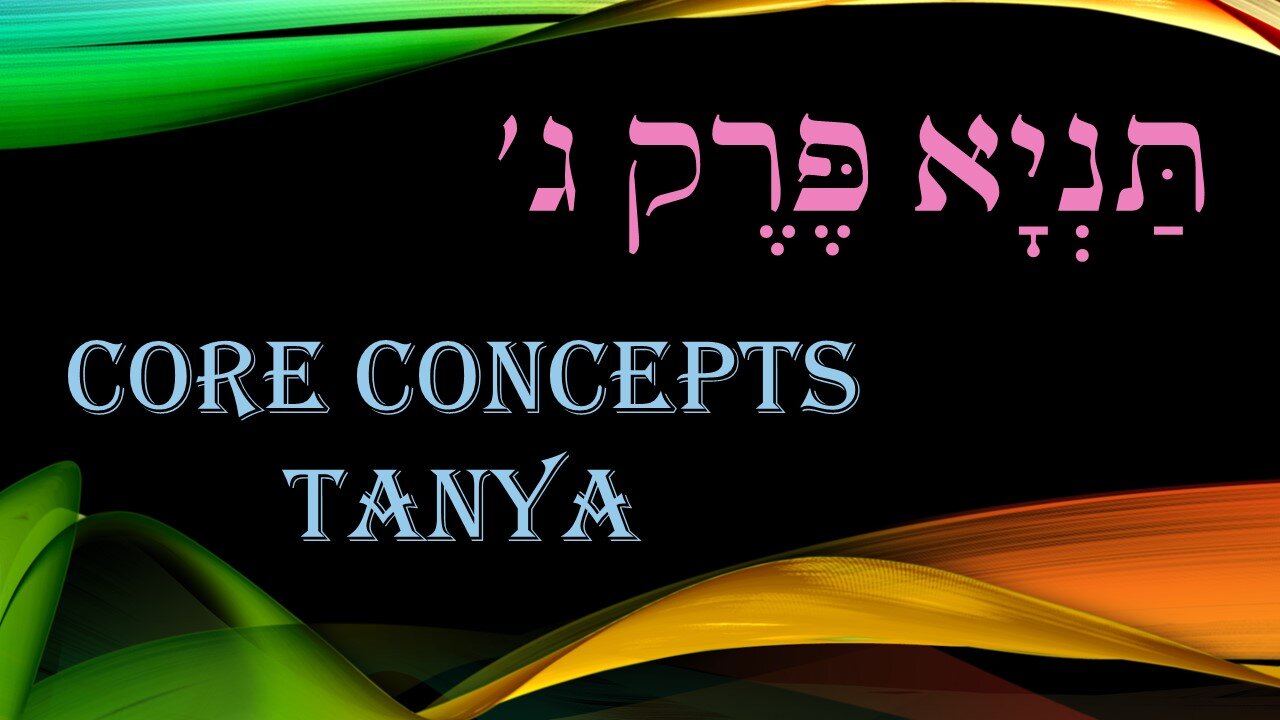Premium Only Content

Core Concepts Tanya: Chapter 3
Brief Recap of Chapter 3:
1. Chapter 3 focuses on the ten soul powers inherent in each of the five levels of the soul. Our nefesh, ruach, and neshama each have their own set of faculties that control or influence them. We don't have much say in what soul we're given, but we do have access to the faculties through which it is expressed.
2. The three intellectual faculties are Chochmah, Binah, and Da'at, Wisdom, Understanding, and the application of Knowledge.
Our intellectual faculties are the parents that give birth to/elicit emotional responses.
This is the basis for how our minds can control our hearts, because with our intellectual faculties we can create, channel, control emotion. As it’s connected to the theme of Tanya, this means that we are and can be in control of the way we react to and feel about the world around us. This means that even if our natural inclination is toward anger or fear or love or whatever, we can change/channel/develop that.
3. Chochmah is the first step, the spark of an idea. If we develop that idea, feel it out, expand on it, examine it from all angles then we are using Binah.
If we want to take action and apply our knowledge or feel something tangible about what we've discovered through the Binah process, then we use Da'at.
Da'at is the binding, the connection between our intellectual discoveries and our emotional responses to it.
4. For example, if we take the time to really think about G-d, about how much He does for us, about how powerful and omniscient He is, about how the entirety of existence is like nothing before Him, then after diligent thought, study, and meditation we'll either feel love, awe, humility, or fear toward Him. If it's love, that love can develop into a burning, fiery passion toward G-d, to the point that our desire to connect with him make us feel as thirsty as a man stranded in a desert without any water in sight. Sometimes we arouse a passion so great it needs to be cooled by our intellect so that we don't do anything extreme. Our intellect also tells us what to do with this burning love once we've ignited it.
5. From this, we understand that even if we are tempted by something that seems beyond our control, even if our natural instincts, desires, emotions tell us to act one way, speak one way, etc, and all we want to do is give in to that, our minds must stay in control. It's as common as when we warn an angry person to control his temper or think before he speaks. Essentially, we're telling him not to give into his emotions, but to allow his intellectual faculties to regain control.
Overall, a general idea of this chapter is that if we want to care about something, then we have to think/study about it. Conversely, if we’re trying to stop caring about something, then we need to remove it from our minds. (This is our house!)
Specifically, if we’re not feeling G-d in our lives, it’s usually because we’re not putting Him into our hearts and minds. We have to think about G-d to feel anything about Him. This is the starting point toward building a relationship that is indeed “very near to you.”
-
 LIVE
LIVE
Phyxicx
3 hours agoMore Halo I guess - 4/17/2025
51 watching -
 37:56
37:56
Michael Franzese
3 hours agoThe Man Who Invented the Mafia: Lucky Luciano
28.1K8 -
 LIVE
LIVE
Jokeuhl Gaming and Chat
1 hour agoEmpyrion - Galactic Survival
30 watching -
 LIVE
LIVE
Joker Effect
13 minutes agoSome people think @PlayMotherland and @IGGYAZALEA are lit... those who do are cool in my book
315 watching -
 LIVE
LIVE
megimu32
2 hours agoON THE SUBJECT: Oops! The Internet Was Funny Before Feelings Got Involved
318 watching -
 48:12
48:12
BonginoReport
4 hours agoTX AG Paxton Joins Hayley, Has Sights Set on Senate Seat - Nightly Scroll w/Hayley Caronia (Ep.29)
52.1K63 -
 1:39:52
1:39:52
AirCondaTv Gaming
2 hours agoRed Alert 3: Uprising - This Command has an Uprising on Alert Pt. 2
5052 -
 14:49
14:49
BEK TV
22 hours agoEP 7 - DUNSEITH DECLASSIFIED: ALLEGED ATTEMPTED MURDER VICTIM ADDRESSES “LOVE TRIANGLE” RUMOR
5.53K2 -

LIVE WITH CHRIS'WORLD
3 hours agoLIVE WITH CHRIS'WORLD - AGAIN ON A THURSDAY?! LETS GO!
3.91K1 -
 LIVE
LIVE
VOPUSARADIO
4 days agoPOLITI-SHOCK! "Exposing Election Theft & Money Laundering"
42 watching